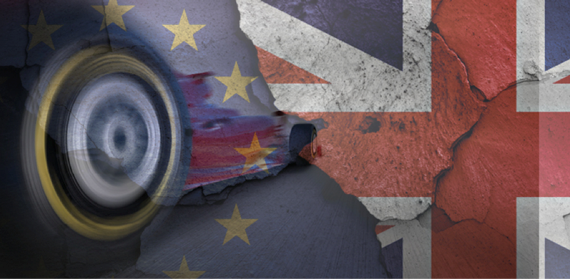Dr. Nick Henry, Centre for Business in Society
As a supposed expert on the UK motorsport industry – if one is allowed to use the term expert these days – I was slightly surprised to be contacted by the FT to discuss ‘F1 and the threat of Brexit’ last week. I must admit my initial thought was ‘is there one, have I missed something?’ and there is a certain level of puzzlement amongst readers in the comments to the subsequent article published at the weekend.
It is pretty much twenty years ago that I first wrote about the UK’s Motorsport Valley and, subsequently, hit the front pages for saying that the industry would not leave these shores in the face of (an EU scare around) Blair, Bernie and Tobaccogate. The industry still hasn’t left these shores and my answer has stayed the same despite being asked quite regularly to comment over the intervening years, including every so often when the future of the British Grand Prix is threatened.
There are challenges to F1 which should cause concern given its unique (R&D and performance engineering) contribution to UK industry, but Brexit isn’t really it. Rather it is more to do with technological change, falling TV audiences, and the digital world of younger consumers – and epitomised in the more than upstart rise of Formula E (currently being studied by PhD student Cristiana Pace here at CBiS and see Coventry Visiting Professor Mark Jenkins.
In fact, the global share of F1 team location in the UK has remained remarkably consistent over the last decades even if the nameplates on the doors haven’t. And that is the point, the new owners have stayed. F1 is the rooted pinnacle, and around a quarter of the £9 billion value, of the constantly adapting broader and bigger UK motorsport industry and its cluster, Motorsport Valley. And so, I a UKTI-funded analysis of supply chains recently, our research showed that Motorsport Valley had already captured a value share of over 40% of the new Formula E supply chain whilst seeking to expand its 40% share of the global Endurance Sports Car chain.
Ask then not of F1 and Brexit but Motorsport Valley and Brexit
To paraphrase my description of the competitive advantage of Motorsport Valley in 2001 for the then Department of Trade and Industry, this included: “1) a technologically sophisticated, knowledge-intensive network of constructors and their overlapping SME supply chains across several related industries; 2) the global centre of a specialist labour market (‘community of knowledge’); 3) large and sustained inward investment flows (technology and media spend) from global corporations (OEM and non-OEM); 4) a relatively high level of participation in motorsport feeding a ‘staircase of talent’ from grass roots upwards; 5) several world motorsport events and their associated activity and 6) THE COMBINATION OF THE FIVE listed above to produce critical mass such that the combined scale, scope and complex interdependence of the industry and sport within the cluster is not matched in its entirety anywhere else in the world.”
The UK industry has continued to globalise successfully in a motorsport market itself going ever more global – although there are some emerging concerns around a ‘hollowing out’ of the supply chain. There are other concerns about grass roots participation, and continued global competition for races and events (sometimes subsidised by new economic nations). But, fundamentally, what has not changed so far is global investment in to this cluster of advanced manufacturing UK-based SMEs drawing engineering talent in from all over the world. Indeed, its influence is spreading through the advanced manufacturing base. Think McLaren Applied Technologies, Williams Advanced Engineering or, more below the radar, the broader innovative and opportunities-driven contribution to our advanced manufacturing expertise that was the focus of the contribution of myself and Visiting Fellow Tim Angus to the recent Silverstone Technology Cluster report by SQW.
Concerning Brexit, the SMEs of Motorsport Valley have always been Britain’s leading exporters so they will have some of the concerns of many of Britain’s SMEs. Yet, as Chris Aylett of the Motorsport Industry Association points out, these SMEs constantly respond to regulatory and technical changes – and they will respond and adapt rapidly to overcome any new barriers or borders as they always do.
What is more concerning is talent and skills. Motorsport Valley has always been a global destination for the best engineers and technicians but the constant, despite large numbers of skills and training initiatives over the last twenty years, has been skills shortages – even in glamorous motorsport. The community of knowledge, and our pre-eminence in motorsport markets, has been built on talented global migrants. Similarly, apart from access to finance, it is this same concern of skilled science, engineering and technical labour that constrains much of the automotive renaissance of the Midlands, from the supply chain SMEs to JLR’s recent expansionary vision.
Motorsport Valley is a unique jewel-in-the-crown of UK manufacturing. Through horizontal innovation, leveraging of its competitive advantage and the continued dynamics of the cluster it is possibly entering an even richer era in contributing to the technological base and industrial competitiveness of the UK. Beyond the spectacle of ‘dirty tricks’ or Brexit it is to the Government’s promised new industrial strategy that my eyes will be turned.




Comments are disabled